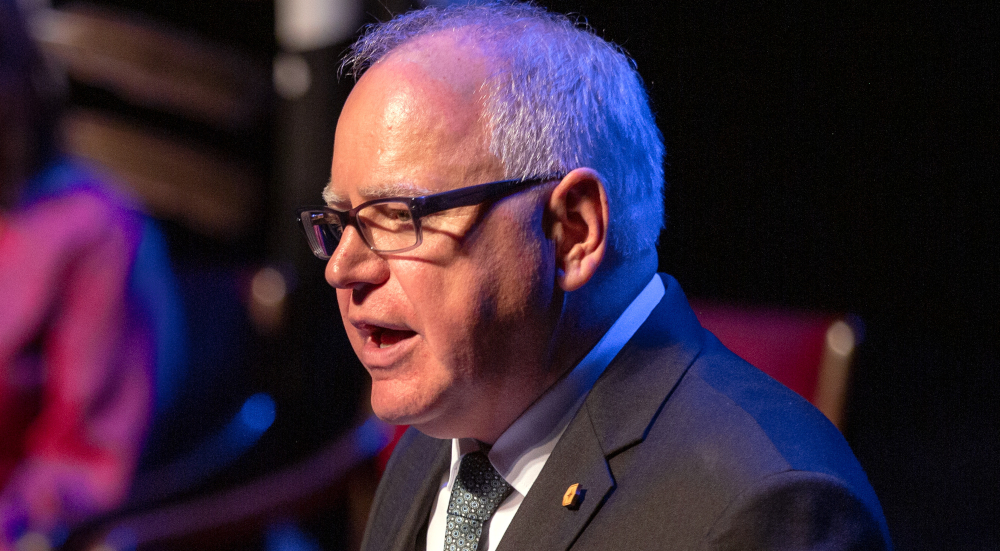Minnesota’s new cannabis law has legalized both high-producing delta-8 and delta-9 THC derived from industrial hemp, and will allow such products to be widely available to consumers.
The relatively low-dose products, which are produced in concentrated form by putting CBD made from hemp flowers through a process in the lab, are preferred by some consumers as an alternative to marijuana, which naturally contains higher amounts of delta-9 THC.
Gov. Tim Walz last week signed the state’s cannabis law, making Minnesota unique among U.S. states because the legislation covers both hemp and marijuana.
Outlier
By legalizing the synthetic compounds, Minnesota has broken with most other states in the U.S., where authorities are working to reign in the CBD-based psychoactive products, which remain unregulated at the federal level and have proliferated in convenience stores and other common retail outlets.
In the absence of regulations, beleaguered CBD producers, squeezed by low margins for off-the-shelf natural extracts amid a lingering oversupply of hemp flowers, have found a market among makers of the synthetic forms of THC.
Edible, but not smokable
The Minnesota law allows products such as gummies and other edibles, and drinks, but not smokable products. It specifically does not allow other synthetic forms of psychoactive hemp derivatives, HHC, THC-P and THC-O.
Delta-8 and delta-9 products made from hemp-derived CBD will not be limited to marijuana dispensaries, and can be sold in liquor stores and other retail outlets, served in restaurants and taprooms, and sold out of state, said Jen Randolph Reise, Head of Business and Cannabis Law at Minneapolis-based North Star Law Group.
Craft breweries and distilleries, and fast-moving entrepreneurs, have already launched hemp-derived THC products, with synthetic delta-9 products recently growing in popularity, according to Reise.
Eager consumers
“Minnesota has proven that producers can create, and consumers are eager to buy, products based on hemp-derived THC,” said Reise, suggesting “Minnesota’s thriving industry in low-dose, hemp-derived beverages and edibles is an experiment relevant for the rest of the country.”
The Minnesota cannabis law retains a per-serving limit of 5 milligrams total THC and a per-package limit of 50mg total THC for hemp-derived edibles. By contrast, Connecticut lawmakers are now considering a measure that would limit the amount of THC in CBD-based products to 1mg per serving, and 5mg per package; and in Colorado, a law expected to be final soon sets a limit of 1.75 mg total THC per serving but does not include a per-package limit.
Minnesota could face headwinds as the U.S. Drug Enforcement Administration (DEA) has indicated it intends to change federal drug-control laws to ban highly concentrated synthetic THC products. The drug agency said in February that the products do not meet the federal definition of hemp and are therefore controlled substances.
Federal lawmakers failed to account for synthetic forms of THC produced from CBD when they legalized hemp through the 2018 Farm Bill. Producers have argued that because the Farm Bill made hemp and its downstream products legal, delta-8 is therefore also legal. In a strict interpretation of the Farm Bill, a U.S. appeals court agreed last year, noting that lawmakers can correct that situation with further legislation. That could come in the 2023 Farm Bill, which is now being debated.
Opponents suggest the 2018 Farm Bill never intended hemp to be used to make psychoactive compounds and that nefarious players are exploiting the bill’s language to sell highly potent synthetic THC products that are often rife with contaminants, inaccurately labeled, and marketed in manners that could be appealing to children.
Cutting red tape
The Minnesota legislation also generally reduces compliance costs, and gives cannabis producers a way to clear other critical hurdles the industry has faced. First, it allows stakeholders to avoid accounting problems inherent in Section 280E of the Internal Revenue Code, which prohibits businesses from deducting expenses under rules related to the trafficking of controlled substances. The new law also eases rules for banking and transactions. For example, customers can now use credit cards to purchase cannabis products, Reise said.
“With Minnesota having approved full legalization, some producers plan to apply for licenses to move into the adult-use market. But some will stay in the hemp-derived market, as it offers significant advantages due to hemp being federally legal,” Reise said.
The bill also sets provisions for testing, labeling and licensing, and imposes a special tax on the products of 10% on top of sales tax. More details on rules are still awaited from Minnesota’s Office of Cannabis Management.
Marijuana provisions
The adult-use marijuana provisions in the new law, which takes effect July 1, create a licensing scheme for commercial operators in 10 business categories, from growers to delivery services. Lawmakers estimated it will be 12-18 months before the state starts issuing recreational marijuana business licenses.
Local governments may opt out of retail sales, which are restricted to licensed dispensaries. Also, adults 21 and older will be allowed to grow up to six plants per household for personal use, beginning in August.
Ahead of the governor’s signing of the bill, Reise wrote on Cannabis Law that the authors crafted the bill to minimize the influence of big cannabis companies eager to enter Minnesota by placing strict limits on vertical integration.

